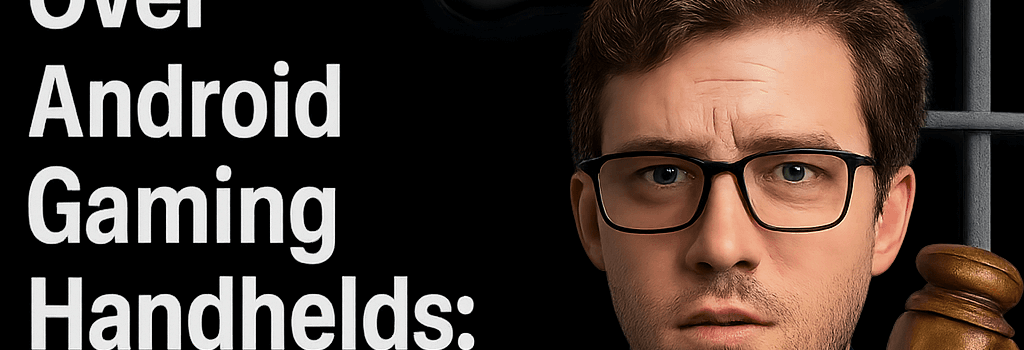YouTuber Faces Jail Over Android Gaming Handhelds: Legal Insights

In April 2025, Italy’s Guardia di Finanza seized more than 30 Android-based gaming handhelds from popular YouTuber Once Were Nerd, alleging that his videos promoted pirated copyrighted materials. Under Article 171 of Italy’s copyright law, he could face up to three years in prison. This article expands on the technical, legal, and community implications of this landmark case.
Background on Android-Based Handheld Emulators
Over the past decade, devices like Anbernic, Powkiddy, and TrimUI have flooded the market. Key specs include:
- System-on-Chip: ARM Cortex-A7/A53 processors at 1.0–1.5 GHz
- GPU: Mali-400 MP2 or Mali-450 MP3 supporting OpenGL ES 2.0
- RAM & Storage: 512 MB–1 GB DDR3 + microSD expansion up to 256 GB
- Display: 3.5″–4.3″ IPS panels, 320×480 up to 640×480 resolution
- Battery: Li-Po 2,500–4,000 mAh, 4–6 hours runtime
These run heavily modified Android versions (often 4.4–6.0) with Linux-based kernels and custom launchers. Emulators like RetroArch, MAME, and PCSX-ReARMed are preinstalled to support retro platforms from SNES and Sega Genesis to PSP and even GameCube.
Italian Legal Action Sparks Controversy
Once Were Nerd’s collaboration with tech review giants brought visibility to these handhelds, but also to the fact that many ship with thousands of preloaded ROMs from Nintendo and Sony. Under Article 171-ter of Italy’s Copyright Law (Legislative Decree 68/2003), the “promotion of pirated copyrighted materials” is a criminal offense. Investigators obtained a search warrant, seized consoles, screenshots, correspondence, and are now examining whether the channel provided links or instructions for illegal downloads.
“While emulation per se is legal, distributing or facilitating access to copyrighted ROMs without permission is punishable by up to three years in jail,” says Italian IP attorney Dr. Martina Rossi.
Technical Deep Dive: Hardware, Software, and Emulation
Experts note that these handhelds balance cost and performance. The ARM cores deliver sufficient clock speed for 16-bit and early 3D emulation, but struggle with advanced shaders and high frame rates on systems like PlayStation 2 or Dreamcast. Input latency (measured at 30–50 ms) remains higher than dedicated consoles. Many devices utilize:
- Custom kernel patches for USB OTG and GPIO control over front-facing buttons.
- OpenGL ES backends with software rasterization fallbacks.
- SD card auto-mount scripts to detect ROM folders named by checksum for “compatibility” claims.
Industry reviewers recommend enthusiasts compile emulators from source to optimize ARM Neon instructions and reduce battery drain by 15–20%.
Legal Landscape and Case Studies
Italy’s heavy-handed approach follows EU Directive EU2019/790, which tightened rules on online infringement. Previous Italian cases include forced ISP DNS poisoning for illicit football streams. In 2020, Spanish court rulings against Amazon for selling preloaded devices set a precedent.
“Nintendo’s global takedown notices exceeded 200 million in 2024,” reports IP research firm LexTrak. “They’re likely behind this complaint.”
Comparatively, the U.S. DMCA provides a notice-and-takedown system, but few jurisdictions criminalize mere “promotion” of pirated content in reviews or tutorials.
Implications for Content Creators and the Emulation Community
This case sends ripples through YouTube’s creator ecosystem. Key takeaways:
- Disclosure & Disclaimer: Always state when ROMs are not included or link only to official sources.
- Monetization Risks: Ad revenue may be frozen during investigations.
- Alternative Models: Subscription retro gaming services—from Nintendo Switch Online to cloud-based emulators—offer legal paths to play classics.
Hardware developers are now bundling blank microSD cards and advising customers to source their own backups of legally owned games.
Future Outlook
As ARM-based handhelds evolve—moving to Cortex-A55/A76, LPDDR4x RAM, and improved GPUs—emulation accuracy and performance will improve. However, manufacturers and content creators must navigate a shifting legal terrain. Expect more proactive DMCA-type enforcement in Europe, and potential collaboration between rightsholders and indie hardware makers to license classic titles legally.